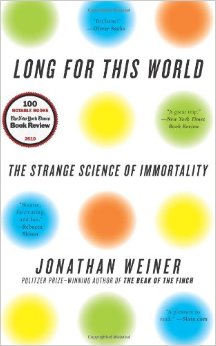 We’ve reviewed several books about Longevity over the nearly two years the Hub has been running, the most recent one being Mark Venning’s review of The 100-Year Life. (See Superlongevity: The 100-Year Life in a Blue Zone).
We’ve reviewed several books about Longevity over the nearly two years the Hub has been running, the most recent one being Mark Venning’s review of The 100-Year Life. (See Superlongevity: The 100-Year Life in a Blue Zone).
I mentioned this book in my talk Thursday to T.E. Wealth, in the context of the prospect of an 80-year investment time horizon for Millennials. (Implication of that: 100% stocks!)
But until now, for obvious reasons, we have held off on the “farther out” topic of immortality.
Even so, there is a growing literature on the topic of what I might term “ultra-longevity.” One in this camp is Long for This World: The Strange Science of Immortality.
Published in 2010 by science writing teacher Jonathan Weiner, the book focuses on a real believer in the possibility of human immortality: one Aubrey David Nicholas Jasper de Grey, who he quotes thus: “When you start talking’ about five-hundred year humans, or one-thousan’-year humans, most members of the general public get a li’l bit nervous.”
Indeed, and Weiner himself seems skeptical, despite providing such a platform to Aubrey de Grey. As the back-cover blurb states, “Could we live forever? And if we could — would we want to?”
As in other reviews, it’s useful to recap the crucial distinction between Life Expectancy and Maximum Life span. Weiner defines Life Expectancy as “the average age that babies born in any given generation or any particular year can expect to reach.” By contrast, “Maximum life span is the longest that any member of a species is known to have attained.”
In the modern era, the maximum human lifespan has been enjoyed by Jeanne Calment of Arles France, who lived to 122 years and four months, or 44,724 days in total. That, Weiner adds in a typical philosophical aside, is roughly the age God promised Adam and Eve after evicting them the Garden: “My spirit will not contend in man forever, for he is mortal; his days will be a hundred and twenty years.”

But Aubrey de Grey thinks there is no limit, Weiner writes:
“He is convinced that we can double or triple our life span again and again … We can engineer as long a life span as we like.”
The scientist set himself the task of solving “the seven deadly things,” a list of scientific reasons our bodies normally break down and eventually die: “There’s junk inside cells; and there’s junk outside cells. There are mutations outside the nucleus. There are too few cells; there are too many cells. And there are the cross-links, which stiffen up our working parts everywhere throughout the body at the finest scale.”
The solutions Aubrey is seeking for these problems he calls SENS, which stands for Strategies for the Engineering of Negligible Senescence.
As an objective journalist, as opposed to an unquestioning acolyte, Weiner does take pains to find other aging and longevity experts who view all this as nonsense, but he also finds credible experts who occupy a reasonable middle ground. One is Jan Vijg of the Albert Einstein School of Medicine, who tells Weiner “we may be able to extend the human life span significantly and soon.” Our bodies have so many flaws that we may be able to fix through “SENS-like interventions … Babies born in 2013 may have a life expectancy of 120 and live halfway into the next century.”
Weiner himself seems both hopeful of and skeptical for such breakthroughs. One of his closing chapters is titled “The Trouble with Immortality.” One such trouble is boredom: as Weiner observes, “for some people, even the life span we have now is boring; they already feel they are too long for this world.”
All in all, though, an entertaining romp that makes you at least consider the possibility of a life span that may be a decade or two longer than what you once might have considered possible. After all, and as others have noted, for every ten extra years we live, advances in medical science are providing a bonus two years of longevity. The longer you live, the more time there is for breakthroughs to occur, and the greater the odds they will occur in time to buy you more time — and so the cycle may repeat, at least for awhile.
How does this relate to Financial Independence?
How does this jibe with the Hub’s views on Financial Independence? As I have said in talks on this topic, even if you mentally add just ten years to your expected lifespan — and seven of those to your workspan — it makes sense to retire a bit later, and explore possible Encore Careers that could last 15 or 20 years. This is of course the subject of my new book written with Mike Drak: Victory Lap Retirement, which should be in major book stores by now, or online here.
Financially, you’d want a bit of longevity insurance (i.e. annuities or true pensions), you’d want to keep Growth investments (i.e. stocks) as long as possible, and you’d want to delay drawing down on those investments for a bit longer.
In short, you’d want to hedge your bets just in case Aubrey de Grey turns out to be even half right.

